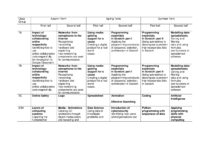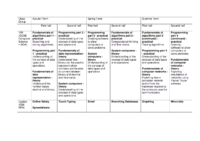Computing, ICT and Media
Curriculum Intent
Technology is vital as a mode of communication for deaf students as well as a means of supporting and promoting their learning.
One aim of our computing curriculum is to educate our students on how to use technology positively, responsibly and safely as well as ensuring they develop the skills and knowledge to be able to maximise their use of technology and are prepared to be able to achieve accreditation at the highest levels possible.
We have structured a broad curriculum encompassing aspects of computer science, information technology and digital literacy to support students to develop fluency with a range of tools.
By building knowledge through the computing curriculum, students will be able to effectively demonstrate their learning through creative use of technology, therefore aspects of computing are embedded across the whole curriculum to further enhance skills and promote creative and accessible learning opportunities.
Our KS3 curriculum is structured using the National Centre for Computing Education’s computing curriculum, which is linked to the National Curriculum of study for KS3. All the learning outcomes are structured from ten strands, as follows:
- Algorithms — Be able to understand, design, create, and evaluate algorithms.
- Computer networks — To understand how networks can be used to retrieve and share information, and how they come with associated risks.
- Computer systems — Understand what a computer is, and how its constituent parts function together as a whole.
- Creating media — To select and create a range of media including text, images, sounds, and video.
- Data and information — Understand how data is stored, organised, and used to represent real-world artefacts and scenarios.
- Design and development — Understand the activities involved in planning, creating, and evaluating computing artefacts.
- Effective use of tools — Use software tools to support computing work.
- Impact of technology — Understand how individuals, systems, and society interacts with computer systems.
- Programming — Creating software to allow computers to solve problems.
- Safety and security — Understand risks when using technology, and how to protect individuals and systems.
Students use digital media to present and evaluate their projects and have a purpose-built media studio in school to develop these skills in tandem with the computing curriculum.
Students also continue to contribute to the new Heathlands Esafety website, which is part of the Heathlands Computing website.
For more information please check the KS4 Media tab.



